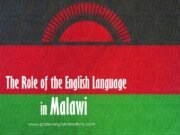Malawi is a landlocked country located in southeastern Africa, bordered by Zambia to the west, Tanzania to the north and northeast, and Mozambique to the east, south, and southwest. It is known as “The Warm Heart of Africa” due to the friendliness of its people. Malawi has a population of over 20 million and is characterized by its diverse culture, beautiful landscapes, and the third-largest lake in Africa, Lake Malawi. The country gained independence from British colonial rule in 1964 and has since developed a multilingual society, with Chichewa as the national language and English as an official language.
 Historical Background
Historical Background
Malawi, formerly known as Nyasaland, was a British protectorate until it gained independence in 1964. During colonial rule, English was established as the language of governance, education, and the judiciary. Post-independence, the government retained English for its unifying potential in a linguistically diverse nation and its utility in global affairs. English in Education
English in Education
Education is one of the primary domains where English dominates. It is taught as a subject in early primary school and becomes the medium of instruction from upper primary onwards, typically from Standard 5. Secondary and tertiary education are conducted almost entirely in English. This policy aims to prepare students for academic advancement and employment in an increasingly globalized job market.
However, challenges persist. Many students, particularly in rural areas, face difficulty in mastering English due to limited exposure and inadequate teaching resources. This often leads to poor academic performance and limits opportunities for higher education and skilled employment.
 English in Government and Law
English in Government and Law
English is the official language of government operations. It is used in parliamentary debates, legal proceedings, and official publications. This ensures consistency in administrative affairs and facilitates international diplomacy and trade. However, the use of English in legal contexts can be a barrier to justice for citizens who lack proficiency in the language.
 English in Media and Business
English in Media and Business
Malawi’s media landscape is bilingual, with English and local languages used across radio, television, and print. Newspapers such as The Nation and The Daily Times are published in English and cater to urban, literate audiences. In the business world, English is the primary language for contracts, correspondence, and corporate communication, especially in urban centers and multinational companies.
 Social Perceptions and Inequality
Social Perceptions and Inequality
Proficiency in English is often associated with education, professionalism, and higher social status. Consequently, those fluent in English tend to have better employment prospects and social mobility. However, this dynamic can also exacerbate social inequalities, as rural and underprivileged populations may lack access to quality English education.
 English remains a crucial tool for communication, education, and economic development in Malawi. While it offers numerous advantages, particularly in international contexts, its dominance also highlights disparities in access and proficiency. To maximize the benefits of English while promoting inclusivity, there is a need for policies that improve English language teaching and ensure that all Malawians, regardless of background, can fully participate in national and global discourse.
English remains a crucial tool for communication, education, and economic development in Malawi. While it offers numerous advantages, particularly in international contexts, its dominance also highlights disparities in access and proficiency. To maximize the benefits of English while promoting inclusivity, there is a need for policies that improve English language teaching and ensure that all Malawians, regardless of background, can fully participate in national and global discourse.
also read:
| ENGLISH LANGUAGE IN CANADA |
| ENGLISH LANGUAGE IN SINGAPORE |
| ENGLISH IN FRANCE |
| ENGLISH LANGUAGE IN AUSTRALIA |
| BRITISH ENGLISH – AMERICAN ENGLISH |
| INDIAN ENGLISH – AMERICAN ENGLISH |







































